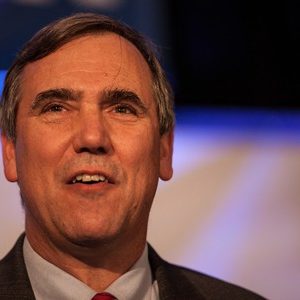Somehow I got on the email list of Steve Novick, a Portland, Oregon, self-described progressive. Novick lost to the even more progressive (if that is possible) Senator Jeff Merkley in the 2008 Democratic primary for U.S. Senate. Novick was then elected to the Portland City Council, only to loose four years later to the even more progressive (if that is possible) Chloe Eudaly.
In his latest email, Novick tells of a conversation with his mother about progressives’ prospects in the 2020 election. It seems his mother is worried that Democrats, fearing that progressives can’t win in the general election, will opt for moderate candidates for Congress.
But Novick is more optimistic. He points to the near success of progressive Andrew Gillum in the 2018 Florida gubernatorial election as evidence that ideology can have little effect on electability — and to the election of Ronald Reagan, “who everybody knew was far too right-wing to win.”
Novick may be right that ideology matters little, particularly in the present climate of political tribalism. The best strategy for progressives may well be to go full bore on nominating their own kind, with a confidence that moderates will be sufficiently loyal to the Democratic tribe to stay on board for the general election. Certainly Republican loyalties elected Donald Trump president notwithstanding his recently having been a Democrat and his distinctly non-Republican views on trade and foreign policy. Not to mention his indifference to basic norms of civility.
Novick reports that he is even more optimistic about progressives’ prospects in the 2020 presidential election. His list of progressive presidential prospects includes Kirsten Gillibrand, Kamala Harris, Bernie Sanders, Cory Booker, Elizabeth Warren and Jeff Merkley.
Jeff Merkley?
Well, I guess Donald Trump was widely thought to be an implausible candidate as well.
While his consistently low approval ratings make Trump’s re-election seem implausible again, his chances would surely be improved with any of Novick’s favored candidates as the opposition. Republicans should be all in with the Novick list, particularly if the nominee campaigns on the policy positions Novick judges them by. His list includes opposition to the military budget (which is “massively wasteful” and the “most obvious” way to fund the Green New Deal), of course support of the Green New Deal (which includes federal funding for renewable energy, insulation of homes, mass transit, bike and pedestrian infrastructure and electric car infrastructure), Medicare for all, a federal jobs guarantee, affordable housing and “most importantly” fighting climate disruption. Being anti-Wall Street is a big plus.
This long list of federally funded programs and benefits will have appeal to many voters. It seems the only thing Novick left out was free college for all — probably an oversight. But except for cutting military spending, Novick offers no suggestion of how this banquet of benefits would be funded. Nor does he recognize what all of this would do to individual liberties and to the personal responsibility necessary to a society that aspires to equal liberty for all.
Novick’s optimism would be well-founded if deep-blue Oregon is representative of the nation as a whole. But it is not. The progressive agenda will appeal to the many who would be direct beneficiaries of its smorgasbord of free stuff, notwithstanding that the young people among those beneficiaries will be left with servicing what can only be an ever larger federal debt. But there may still be enough voting taxpayers to resist the progressives for now. At least we should hope so, even if we are stuck with Trump for an additional four years.

